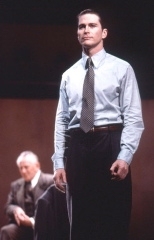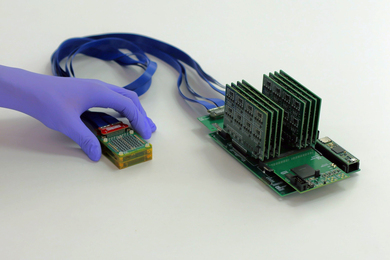Why did Werner Heisenberg visit his former colleague and mentor Niels Bohr in Copenhagen in 1941? What happened at that mysterious meeting that caused a permanent rift between the men? Can quantum mechanics and the uncertainty principle be theatrical?
Michael Frayn examines these questions in his award-winning play, "Copenhagen," which is playing at the Colonial Theatre in Boston. The play reenacts the visit of Heisenberg, who was then in charge of the Nazi nuclear power program, to Niels Bohr, with whom he created quantum mechanics, complementarity and the uncertainty principle.
Professor Ulrich Becker of physics met with the cast of "Copenhagen," on Tuesday, May 7, giving them a tour of MIT's cyclotron, an experimental magnet built in 1938 to aid in the development of nuclear physics.
The MIT Office of the Arts and Boston's Goethe Institute will host a symposium titled "New Thoughts on Interpreting 'Copenhagen'" on Monday, May 13 from 7:30 p.m. to 9:30 p.m. in Wong Auditorium, in conjunction with the performance of the play at the Colonial Theatre in Boston.
Associate Provost for the Arts Alan Brody will moderate a discussion as physicists, actors, family and colleagues of the protagonists consider the scientific, historical, philosophical and artistic dimensions of this encounter. Professor Emeritus Laszlo Tisza, who taught physics at MIT from 1941-1973, will offer personal reminiscences of Bohr and Heisenberg.
Tisza learned quantum mechanics in 1928 when the field was in its infancy. He spent a semester in Heisenberg's department in Leipzig in 1930 and met Bohr for the first time in 1934. Although Tisza admits he doesn't have personal knowledge of the Copenhagen encounter he said, "I have a good sense of Heisenberg's scientific style and have an opinion of why he failed to achieve more in the Uranium Project. My early sense of the individual styles of the protagonists was reinforced by my later interest in the history and philosophy of physics."
The symposium also will include discussion of the letters Bohr wrote but never sent to Heisenberg, which were released by Bohr's family last February. Each panelist will speak individually, followed by a group discussion and and a question-and-answer period. For more information, call x3-2341.
Panelists are Jochen Heisenberg, professor of physics at the University of New Hampshire; Gerald Holton, professor of physics emeritus at Harvard University; Mariette Hartley, the actor who portrays Margrethe Bohr in the play; Hank Stratton, the actor who portrays Werner Heisenberg; and Tisza.
A version of this article appeared in MIT Tech Talk on May 8, 2002.






